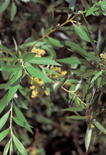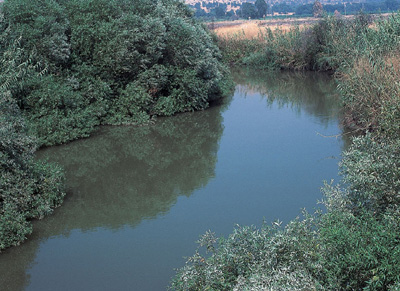

Leaves and branches of willow in northern Israel along the Jordan River.
WEEPING WILLOW IS A MISNOmer for any tree in the Bible and in fact is not even native to western Asia. Consider this verse: “By the rivers of Babylon, there we sat down and wept, when we remembered Zion. Upon the willows in the midst of it we hung our harps” (Psalm 137:1–2, NASB). The “willows” of Babylon are probably not true willows but rather a kind of poplar, Populus euphratica.
There are several species of true willow in the Middle East; two of the more common are Salix acmophylla and S. alba. The Bible does not indicate which species are meant. Willows are common along permanent watercourses and form dense thickets along the banks of the Jordan River, especially at its upper reaches. These denizens of stream banks are mentioned in only four places: “On the first day [of the Feast of Shelters] you will take choice fruit, palm branches, boughs of leafy trees and flowering shrubs from the river bank, and for seven days enjoy yourselves before Yahweh your God” (Leviticus 23:40, NJB); “The leaves of the lotus give him shade the willows by the stream shelter him” (Job 40:22, NJB); “That is why they are carrying what they could save of their stores across the Ravine of the Willows [or poplars]” (Isaiah 15:7, NJB); and, “They will spring up among the grass, like willows on the banks of a stream” (Isaiah 44:4, NJB).
The willow is a much-branched shrub or small tree with narrow, pointed leaves that are lighter green on the bottom surface. Each shrub is unisexual and the flowers are minute and borne in the spring. The seeds are equipped with hairs that enable them to float through the air and ensure their dispersal. For eons, the bark of the willow has been used as a medicine; it is from willow bark that aspirin was first extracted.

Willows along the upper reaches of the Jordan River, Israel.
The wood of willow is soft and not very durable. But it was used in Bible days for bowls, other utensils, and some construction (Gale et al. 2000). While the wood is considered poor quality, the narrow stems, or withes (also spelled withs), are still used to make baskets and may have been used by Delilah to bind Samson (Judges 16:7–9). A traditional use of willow wood in Syria is for crafting a form for darning clothing: the wood is cut into an egg-shaped structure that fits into a sock and easily absorbs darning needle jabs.